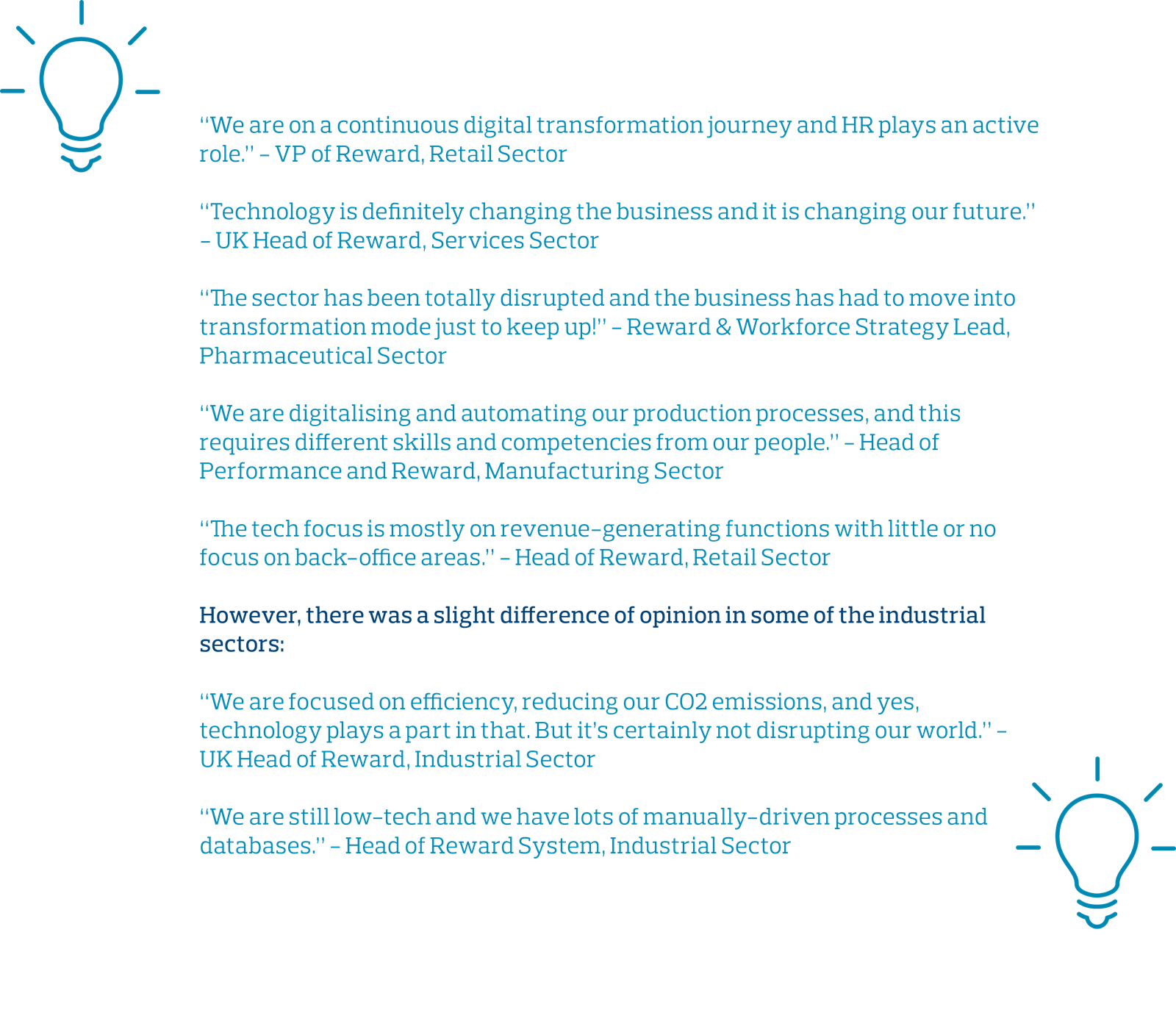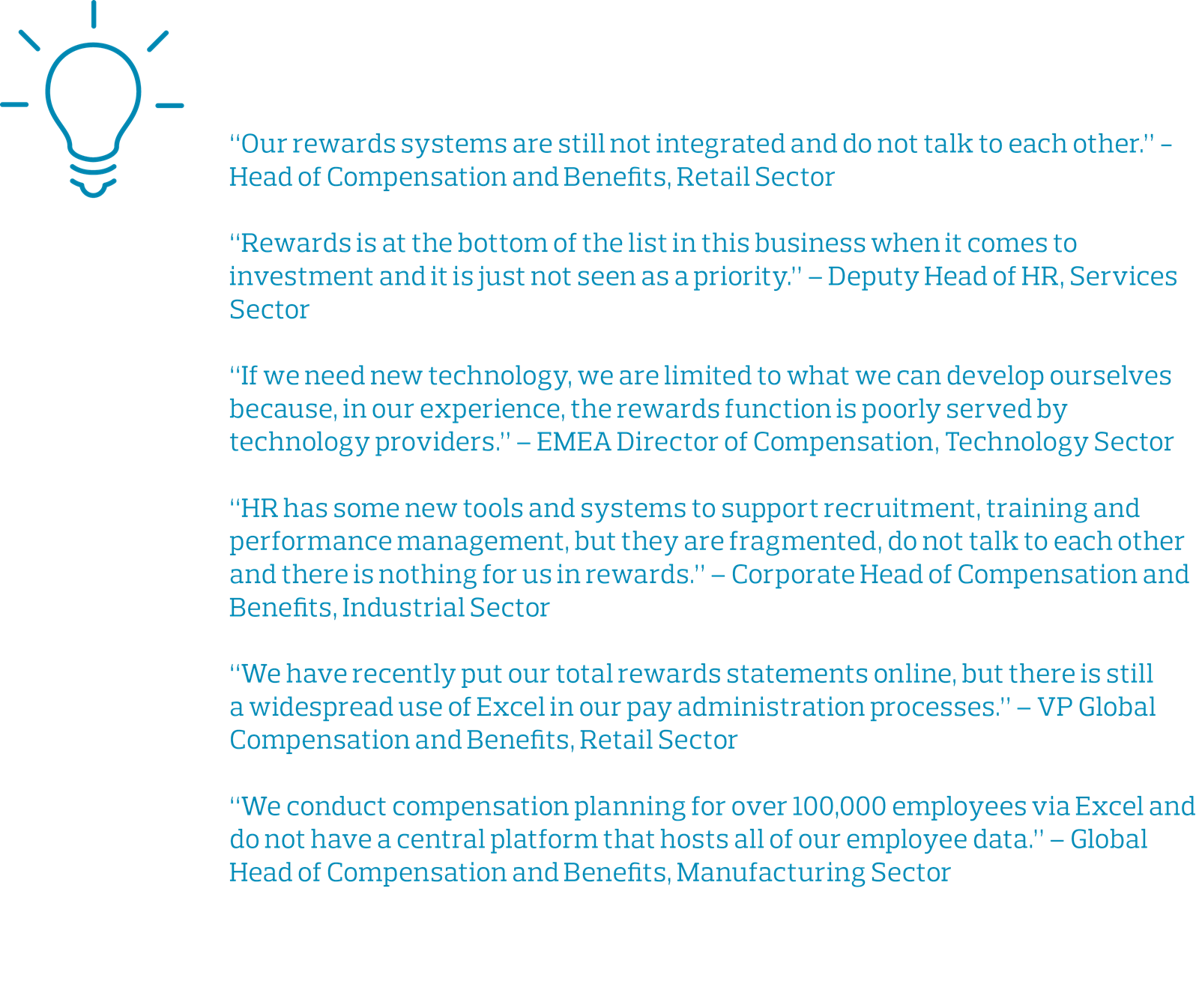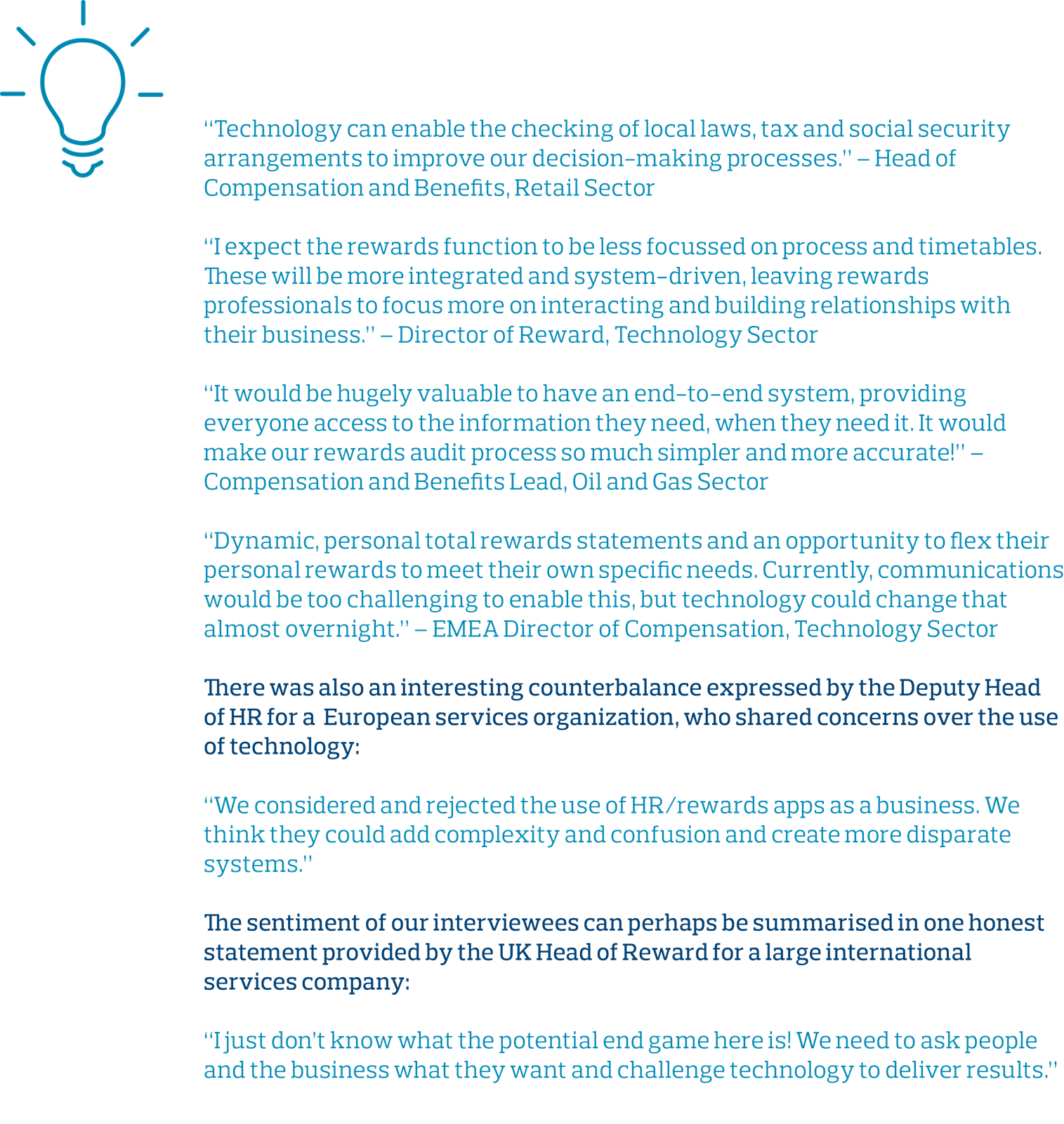In the third and final article of our European Leaders in Rewards series, we discuss whether rewards functions are benefitting from the digital revolution to the same extent as other business areas.
 In the first half of 2020, Aon held interviews with more than 50 senior rewards professionals from some of the best-known brands and employers across Europe. Their opinions were sought on three different topics, which we examine in three separate articles. The first article looked at the role of analytical job evaluation schemes in the modern world of work. The second article reflected upon the potential segmentation of rewards as an engagement tool, and this article — the final in the series — considers whether rewards functions are benefitting from the digital revolution to the same extent as other business areas.
In the first half of 2020, Aon held interviews with more than 50 senior rewards professionals from some of the best-known brands and employers across Europe. Their opinions were sought on three different topics, which we examine in three separate articles. The first article looked at the role of analytical job evaluation schemes in the modern world of work. The second article reflected upon the potential segmentation of rewards as an engagement tool, and this article — the final in the series — considers whether rewards functions are benefitting from the digital revolution to the same extent as other business areas.
Through the course of our discussions, we explore important questions and debate around the future shape and structure of the rewards function.
COVID-19 is Accelerating Technology-Enabled Solutions
In recent years, the level of disruption caused by technology on all areas of business has accelerated, impacting every aspect of our lives.
- Consumers now have access to the global marketplace at levels that would have been unheard of even 10 years ago, including the convenience of next-day delivery to our doorstep through technologically enhanced and enabled distribution processes. These changes have rapidly become the established norm. For example, during the unprecedented economic shut-down in response to the COVID-19 pandemic, children switched to remote learning, with the ability for parents to monitor and track their progress thanks to advanced technology. Today’s youth, in particular, expect technology-enabled solutions.
- From a business perspective, technology has impacted organisations and led to completely new business strategies and approaches to help ensure that technology is exploited as fully as possible.
- An organisation’s relationship with its employees has also been fundamentally impacted, allowing for remote work and effortless engagement with colleagues and clients from every corner of the world.
Societal norms and expectations have, and continue to, evolve. Embracing digital tools and advancements is key to retaining the ability to compete in the current market. Firms that are unable to offer their consumers the choice of next-day delivery or their employees the ability to work remotely are increasingly in the minority.
The digital revolution has been gradually building momentum over the last decade, but the COVID-19 pandemic has only increased the pace of this change. To put this into perspective, whilst organisations did have access to video conferencing technology in 2019, it was vastly underutilised. Just a year later, and following numerous improvements, remote video conferencing systems are powerful enough to hold workforces together in this virtual world. The ways in which organisations are maintaining employee engagement, motivation and wellbeing in this new environment is now front and center as a business concern.
The Digital Revolution is Very Real
Agility, flexibility and pace have become keywords for most organisations in the last year. Nearly every dimension of business and people strategies, processes and ways of working have been forced to quickly evolve and adjust to the new normal, finding ways to compete in a world that is highly dynamic and subject to rapid change.
In this context, it may be surprising to discover that we still come across large and complex national and international organisations using basic spreadsheets to manage their payroll and calculate budgets and bonus awards. Rewards solutions are being delivered to employees through traditional methods and, in many cases, it appears that the technology revolution has not penetrated the function in the same way as it has for other areas of a business. We explored this subject further in our research.
We began by asking whether technology had impacted or was shaping their organisations’ strategy. The feedback was unambiguous:

The overwhelming message is that the digital revolution occurring in business is very real. Many participants even commented on the important role that HR has on the journey. During the last recession, we saw these function leaders moving from transactional business partners to serving as a strategic asset in the boardroom. This move was combined with a shift from managing people costs to leveraging them, and an increased understanding of the competitive advantage offered by an organisation’s workforce. Recent feedback on digital progress serves as a solid indication that HR has maintained its strategic impact on many firms and is continuing to be recognised as a significant change agent and critical business function.
Are Businesses Fully Exploiting Technology in Rewards?
It soon became clear that most rewards leaders we spoke with acknowledged the importance of technology for business success in both the current and future climate. We then asked our participants whether technology is being developed and exploited to manage relationships with employees to the extent that it is in other business areas. Their responses indicated that, in comparison, technology is lacking. In fact, many rewards functions across industries say they feel they are playing catch-up:

However, there are some signs of improvements and a change in focus. A small number of participants referred to recent introductions of more integrated and centralised technology solutions. They spoke of future plans and ambitions, with some already beginning the journey. Plans covered both rewards delivery and enabling more efficient rewards functions and processes. On the delivery side, firms were focused on the development of supplementary employee and line manager self-service solutions and options, including more smartphone accessibility. These positive developments will have an impact on the operation and structure of the rewards function itself and we are seeing technology enabling more centralised rewards management and delivery models. Organisations are also discussing strengthened shared service centres to help manage additional dimensions of the rewards offer.
The Possibilities Offered by Technology
As described previously, there was a clear sentiment that the rewards function is underserved by technology when compared to other business areas. With this in mind, we asked leaders in rewards for their views on how best-in-class organisations could use technology to greater effect. Feedback on offering improved levels of employees and line manager accessibility was a consistent theme. Additional observations included:

Next Steps
Technology presents many possibilities for organisations in how they manage and deliver rewards. These benefits are yet to be seen for many firms, although the start of the digital journey for rewards is on the horizon. The doors this would open are clear, allowing for integrated data systems and simpler, more centralised processes that would undoubtedly improve customer-client and internal employee relationships in the years to come.
Although moving in the right direction, the path towards the use of improved technology in the rewards function is already facing a challenge. The COVID-19 pandemic has significantly impacted organisations across the world, including Europe. Market disruption does drive change, but on a very practical level, technology solutions come with quite a heavy cost. Technology investments that may have previously been set aside for rewards systems could now be under threat, as businesses look to survive through a particularly difficult and challenging time. A small number of firms in sectors that have been especially impacted by the crisis are already pausing plans. Change is clearly coming, and ironically, the COVID-19 pandemic may simultaneously drive and impede that change, creating yet another challenge in a world of change.
For questions about the topics discussed in this article, please contact one of the authors or write to rewards-solutions@aon.com.
COVID-19 Disclaimer: This document has been provided as an informational resource for Aon clients and business partners. It is intended to provide general guidance on potential exposures, and is not intended to provide medical advice or address medical concerns or specific risk circumstances. Due to the dynamic nature of infectious diseases, Aon cannot be held liable for the guidance provided. We strongly encourage visitors to seek additional safety, medical and epidemiologic information from credible sources such as the Centers for Disease Control and Prevention and World Health Organization. As regards insurance coverage questions, whether coverage applies or a policy will respond to any risk or circumstance is subject to the specific terms and conditions of the insurance policies and contracts at issue and underwriter determinations.
General Disclaimer: The information contained in this article and the statements expressed herein are of a general nature and not intended to address the circumstances of any particular individual or entity. Although we endeavor to provide accurate and timely information and use sources we consider reliable, there can be no guarantee that such information is accurate as of the date it is received or that it will continue to be accurate in the future. No one should act on such information without the appropriate professional advice after a thorough examination of the particular situation.
Related Articles